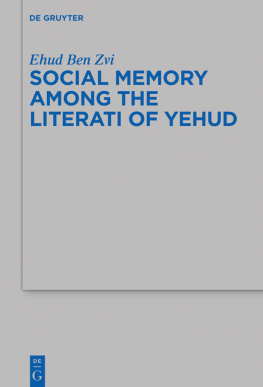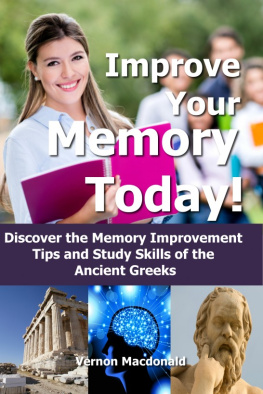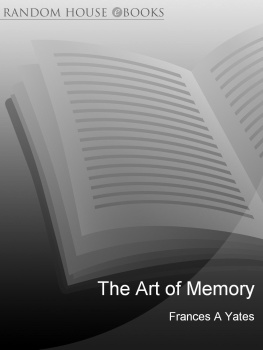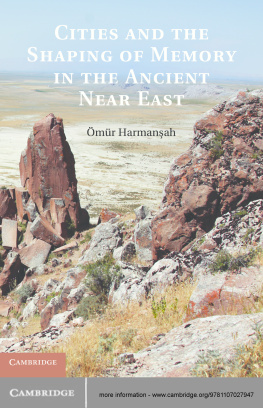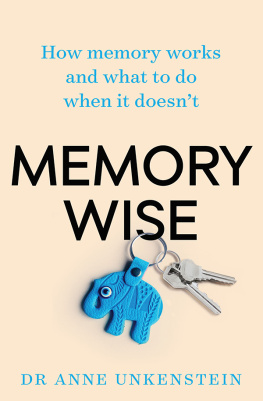Envisioning the Past Through Memories
Cultural Memory and History in Antiquity
Series Editor:
Martin Bommas, University of Birmingham
Advisory Board:
Geoffrey Cubitt, University of York
Franco DAgostino, University of Rome La Sapienza
Christopher Smith, British School at Rome
Christopher Wickham, University of Oxford
Other titles in this series:
Cultural Memory and Identity in Ancient Societies, edited by Martin Bommas Memory and Urban Religion in the Ancient World, edited by Martin Bommas, Juliette Harrisson and Phoebe Roy
Contents
Davide Nadali
Paolo Matthiae
Federico Contardi
Davide Nadali
Nicola Laneri
Mehmet-Ali Ata
Amy Rebecca Gansell
Seth Richardson
Silvana Di Paolo
Martin Bommas
Culture as a set of shared attitudes, values and practices that characterizes a group or society modern as well as ancient is to a large extent based on the construction and transmission of memories. Differing from collective and individual approaches to the past, cultural memory describes a process that emerges from distant and collateral events and only appears in standardized forms once a group or society has agreed upon them. Memory is a phenomenon that by definition is directly related to the present. When dealing with ancient societies, cultural memory as a tool can be used to disclose and identify this contemporary presence of the past within ancient societies. When investigating cultural memory of past societies, key questions are how and what ancient societies remembered about events that shaped the formation of their identity, and how they built on agreed memories to create a collective present. The term cultural memory was first introduced in 1992 by the German Egyptologist Jan Assmann in his book Das kulturelle Gedchtnis. Schrift, Erinnerung und politische Identitt in frhen Hochkulturen (translated in English as Cultural Memory and Early Civilization: Writing, Remembrance and Political Imagination), in which he further developed the theory of collective memory, first established in 1950 by the French philosopher and sociologist Maurice Halbwachs in La mmoire collective (translated in English as On Collective Memory). Although Assmanns approach was soon adopted by linguists, sociologists and anthropologists, ancient historians and classicists only slowly incorporated this term into the vocabulary of their disciplines. Today, Historical Studies and contiguous disciplines are increasingly reconsidering the question of history versus memory, rethinking historys border zone. The use of competing terms such as collective memory, social memory and cultural memory all discussing the ways in which individuals remember the past and at the same time define their social experience and involvement has led to confusion about how social connections work and where priorities lie when human beings construct their relationship with the past. As historians, we are unable to access the mental process of culturally defined memory of the past but only how memory is embodied in texts and objects. This new series is designed to investigate the role of physical remains or rather material memories such as written and archaeological sources that were regarded to have had symbolic significance by ancient societies. By identifying the ways in which the collective past was remembered by ancient societies as cultural memory encoded in archaeological and written data, this series will address and respond to the challenges that come with this term when used uncritically. Social memory, if pushed too far, inevitably represents a theoretical and idealizing picture of the past in the past, if the influences of conflict and the use and abuse of power of groups over others are not taken into account. Diverse recollections of the past can deconstruct cultural memory and hamper its integration into a collective past. In order to allow cultural memory to construct a collective past, groups of power can encourage and promote remembering, marginalize individual memories, initiate reinterpretation or even actively instruct forgetting. The series Cultural Memory and History in Antiquity aims to reveal the mechanics of social connections in order to understand better the sources of collective pasts and to identify their continuative drifts rather than the connections established between generations. The motor of cultural memory is actively practised memory based on an agreed set of data, rather than tradition. In tracing shifts of meaning within ancient society, both cultural memory and cultural forgetting offer purposeful tools to identify the courses of history through both elite and non-elite perspectives.
Martin Bommas,
Series Editor
The papers collected here were presented at the international congress Value and Power of Memory in Ancient Societies, held in Rome at the Sapienza University (25th26th November 2013). The conference was possible thanks to the financial support of the Sapienza University with the Congressi e Convegni annual grant.
I wish to thank all participants for their contributions and the stimulating debates; special thanks are for Martin Bommas (University of Birmingham) and Bloomsbury Publishing for publishing the proceedings in the series Cultural Memory and History in Antiquity.
Mehmet-Ali Ata studied Architecture, Art History and Archaeology, earning his PhD from Harvard University in 2003. He is the author of The Mythology of Kingship in Neo-Assyrian Art (Cambridge, 2010), Art and Immortality in the Ancient Near East (Cambridge, forthcoming) and several essays on the art and thought of ancient Mesopotamia. He is Associate Professor of Classical and Near Eastern Archaeology at Bryn Mawr College.
Martin Bommas is Reader in Egyptology at the University of Birmingham. He studied Egyptology, Classical Archaeology and Near Eastern Archaeology at the Universities of Heidelberg (Germany) and Leiden (the Netherlands). He became field director at the excavations on Elephantine Island when he was 23, and Research Fellow in a philological research project on Mortuary Liturgies with Jan Assmann four years later. After his PhD he became Assistant Professor at the University of Basel (Switzerland) before he arrived at Birmingham in 2006. He had visiting appointments at the Universities of Heidelberg, Basel, Rome, Venice and Sheffield. Among more recent publications are Das Alte gypten, Wissenschaftliche Buchgesellschaft (Darmstadt, 2011) and Cultural Memory and Identity in Ancient Societies, CMHA 1 (London, 2011) as editor.
Federico Contardi (PhD in Egyptology, Sapienza University of Rome and Free University of Berlin) participated as a research associate to international projects at the University of Heidelberg and for the Italian Research Council (CNR). He taught Egyptology in Italy (Rome, Udine) and Germany (Berlin, Tutorium). He is a team member (epigraphist) for the archaeological mission of the University of Rome at Thebes-West (TT 27) and at the temple of Hathor at Philae. Currently he is a research associate for the VGA (Vocabulaire de lgyptien Ancien) project at the University Paul-Valry, Montpellier.
Silvana Di Paolo is a researcher at the Istituto di Studi sul Mediterraneo Antico (CNR-Italy). Her research interests cover the archaeology and art history of Mesopotamia and Syria on the one hand, and of ancient Cyprus on the other hand (2nd1st millennia BC). Her work focuses on crafts in the artisanal and visual culture shared among the Ancient Near Eastern polities. She has written extensively on the relationship between art and power, location and styles of workshops, and social meaning of works of art. She is currently finalizing the multi-author


